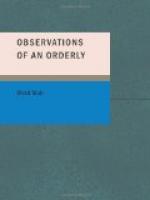Presumably regular customers receive teaspoons, for teaspoons lie in a heap on the fat, jolly man’s side of the counter. This was the case at the coffee-stall before which the young soldier and I ranged ourselves. And the heap of teaspoons seemed to exercise a curious fascination upon the soldier. He continued to stare at them for some minutes after I had set in front of him his cup of coffee. Then he stared at the fat, jolly man, who was cutting slabs from a loaf. He stared for a long time, making no reply to my remarks.
Rain began to patter on the awning—it had rained earlier in the night—and I became aware of a figure, lurking in the background on the pavement, beyond the awning’s shelter, but within the radius of the haze of light projected therefrom. It was a wretched, slinking figure, that of an elderly man with bleared eyes and a red nose: one of those pariahs who haunt cabstands and promote the cabs up the rank when the front vehicle is hailed. This special specimen of his breed appeared to be a satellite of the coffee-stall proprietor: perhaps he helped to tow the stall to its berth. Whatever might be his function, he lingered on the outskirts of the ring of light, watching us; and the young soldier, in his slow scrutiny of the stall and its surroundings, caught sight of him, and stared stolidly, as he had stared at everything else.
I was in the act of drinking my coffee when the soldier suddenly leant across the counter, picked up a spoon, turned, and threw it at the derelict whose face wavered on the edge of the lamplight’s circle. The victim of this extraordinary attack dodged the missile, then grovelled after it in the gutter. Meanwhile the fat man (instantaneously ceasing to be jolly) gave vent to an angry protest.
“Wotcher do that for? Chuckin’ my spoons abart! Drunk, that’s wot you are!”
“Ain’t drunk!” said the soldier.
“Wotcher chuck my spoon at ’im for, then? ’E ain’t done you no ’arm.”
“Yus ’e ’as,” was the soldier’s surprising retort.
“No ’e ain’t.”
“Yus ’e ’as.”
“No ’e ’ain’t. ’E ain’t done you no ’arm.”
To which the derelict chimed in (he had retrieved the spoon and now advanced timidly with it under the awning): “I ain’t done you no ’arm”—a husky, whimpering chorus to his fat patron.
The soldier fixed the derelict with a fierce glare. “Yus you ’ave,” he reiterated.
I was wondering how the dispute might develop, but evidently my ear is unattuned to the nuances of these dialectics. The soldier’s glare and the soldier’s tone must have betrayed themselves to the two other men as factitious; the derelict, anyhow, lost his nervousness and, approaching nearer, scanned the soldier with dim, peering eyes; then broke into a joyous grin and exclaimed:
“Lumme, if it ain’t ol’ Bert!”
And the fat man, leaning on his counter, and likewise examining the soldier, cried, “Ol’ Bert it is!”




